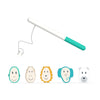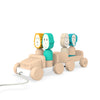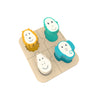How To Get A Toddler To Sleep
It’s late, you know your toddler should be fast asleep by now, but getting toddlers to settle and go to sleep can be very difficult. Firstly, you are not alone in this. Nearly every parent has to deal with this issue at some stage, and every toddler is different, and so there isn’t a one size fits all solution.
It is important that your child gets enough sleep, the image below shows roughly how many hours of sleep your child needs. A well-rested toddler means a happier, well-rested household for everyone else.

Lots of young children have problems settling to sleep and will wake up during the night. For some people, it might not be a problem. However, if you, your child, or the rest of the family are suffering from a lack of sleep - there are some things you can try.
Try our six simple tips below and hopefully your toddler will settle more easily, and you can have a well-deserved cuppa...
1. Stick to a routine
Make sure your toddler has the same wake-up and sleep times each day. Also, make sure that their nap time is not too late in the day to avoid any interference with their sleepy time. If you would like this time to be earlier, then make the change gradually. It will take patience, but allowing your child time to adjust can make the transition easier. Bring the time forward by only 5 - 10 minutes each week, until you get to the bedtime you want.
2. Create a calm environment
At least 30 minutes prior to sleep time, make sure to create a calm environment for your toddler. Try reading a book or having them take a bath as part of this routine, avoid high stimulation activities like TV or movies. Set a limit on how much time you spend tucking your child in, read just one story to settle your child then say goodnight. A toddler will happily drag this process out for as long as you let them, so be calm, use a quiet voice, and explain what is going to happen. Consistency is important here too, only one story every night, then go.
3. Keep a dark and calm bedroom environment
Don’t allow your child to watch TV in their bedroom or have any screen-time in their bed (iPads, iPhones, etc). You can have a dim nightlight and soft music, but avoid anything with a screen.
4. Limit food and drink before bedtime
Do you remember the movie Gremlins? One of the rules was not to feed or give them water after a certain time. Practice this rule with your toddler to avoid having him go from cute and cuddly to full Gremlin.
5. Tuck your child into bed
Make sure to tuck your child into bed while they’re in a sleepy state, but still awake. You want them to learn to put themselves to sleep.
6. Nightmares
If your toddler has a nightmare and runs into your bed, then that’s perfectly ok. However, once he has calmed down then he should be placed back into his own bed. Try surrounding him with various items of comfort to make him feel safe and learn to fall asleep on his own
If your child will not go to sleep without you

This technique can help toddlers or older children get to sleep, without you having to be in the room. This might also come in handy in the middle of the night if your child wakes. The first few times you try this, it could take a while, so have patience and stick with it.
- Settle your child as above and then promise to go back in again in a few minutes for another kiss, return almost straight away.
- Promise to come back in a few moments, then put some washing away or tidy something in the room.
- Next, do something outside the room before going back.
- If they get out of bed, say: “Get back into bed, and I’ll give you a kiss”.
- Keep going back until they are asleep.
- Repeat every time your child wakes during the night.
Help your disabled child to sleep
Sometimes children with long-term illnesses or disabilities find it more difficult to get to sleep and to stay asleep all night. This can be challenging for everyone. There are some organisations that you might like to contact for support. The charity Contact has more information about helping you and your child sleep. Scope also has sleep advice for parents of disabled children.
It can take patience, consistency, and commitment, but most children’s sleep problems can be resolved. Just hang on in there!





























